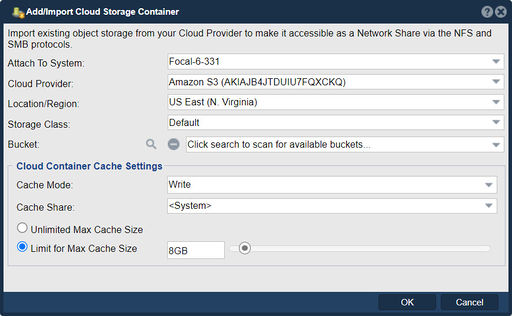Add Cloud Storage Container

In QuantaStor, the purpose of adding or importing a cloud storage container is to establish a connection and manage a specific storage container within a cloud storage provider. This feature allows you to integrate and utilize cloud storage containers within your QuantaStor environment, enabling seamless access and management of cloud storage resources.
If you have a cloud container that you have previously created with QuantaStor you can recover it by re-adding it to the system via this dialog. Deduplication style containers should start with 'qs-bucket', the one-to-one type containers can use any existing bucket.
Here are the main purposes and benefits of adding or importing a cloud storage container in QuantaStor:
- Cloud Storage Integration: By adding or importing a cloud storage container, you establish a connection with a specific container within a cloud storage provider, such as an S3 bucket in Amazon Web Services (AWS) or a blob container in Microsoft Azure. This integration enables you to leverage the cloud storage provider's capabilities and resources within your QuantaStor environment.
- Storage Expansion: Adding or importing a cloud storage container allows you to expand your storage capacity by utilizing cloud storage resources. You can seamlessly integrate cloud storage containers with your existing on-premises storage, enabling storage expansion without the need for additional hardware procurement or infrastructure setup.
- Data Migration: You can use the "Add/Import Cloud Storage Container" feature to migrate data between on-premises storage and cloud storage. This allows you to transfer data to the cloud, whether for long-term archiving, offsite backup, or transitioning to a cloud-based storage model.
- Data Tiering and Storage Optimization: QuantaStor supports data tiering, where you can automatically move data between different storage tiers based on usage patterns or policies. By adding or importing a cloud storage container, you can configure it as a storage tier, offloading less frequently accessed data to the cloud while keeping frequently accessed data on-premises, optimizing your storage resources.
- Hybrid Cloud Deployments: Adding or importing a cloud storage container facilitates hybrid cloud deployments, enabling seamless integration between on-premises storage and cloud storage resources. This flexibility allows you to build hybrid architectures that combine the benefits of both on-premises and cloud storage, ensuring data availability and scalability.
- Backup and Disaster Recovery: QuantaStor can use cloud storage containers as destinations for backups and disaster recovery purposes. By adding or importing a cloud storage container, you can configure backups or replication tasks to the cloud, providing an offsite copy of your data for data protection and disaster recovery scenarios.
- Object Storage Capabilities: Cloud storage containers are typically based on object storage technology, which offers features such as scalability, durability, and metadata management. By adding or importing a cloud storage container, you can leverage these object storage capabilities within your QuantaStor environment, allowing for efficient and scalable storage management.
- Multi-Cloud Support: QuantaStor supports multiple cloud storage providers. By adding or importing cloud storage containers from different providers, you can manage and utilize storage resources from various cloud environments, providing flexibility, redundancy, and the ability to choose the most suitable provider for specific use cases.
In summary, adding or importing a cloud storage container in QuantaStor allows for seamless integration and management of cloud storage resources within your storage infrastructure. It enables storage expansion, data migration, tiering, hybrid cloud deployments, backup and disaster recovery, and leverages the scalability and capabilities of cloud storage providers.
Navigation: Cloud Integration --> Cloud Storage Containers --> Cloud Container --> Import (toolbar)
For additional information: Cloud Containers/NAS Gateway